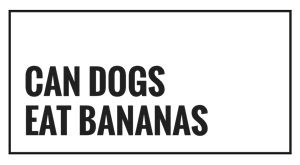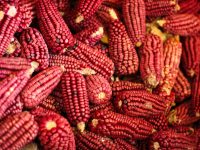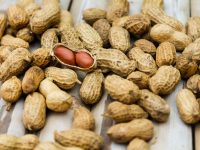Nuts are a great way for humans to get extra protein, especially for vegetarians and vegans. However, dogs are a bit different. Though they certainly enjoy snacking on fresh produce, the majority of their diet should come from animal protein. But where does this leave nuts on the dog safety scale? Can dogs eat pecans? Let’s explore the nutrition value of this nut.
Can Dogs Eat Pecans?
Pecans may not be the most popular nut in an assorted mix, but they certainly make for a great pie. But is it safe to toss your dog a nut or two? Like many nuts, pecans are not safe for dogs to eat.
Why do so many nuts earn such a bad rep for dogs? While different nuts vary in danger levels, and select nuts can be considered safe, nuts often provide a variety of health complications for canines. Nuts can cause upset stomachs, GI obstruction, and even toxic poisoning when consumed by dogs.
Pecan Pup Perils
What in particular makes pecans potentially poisonous to dogs? Pecans have a toxin in them known as juglone. This toxin is linked to laminitis, a vascular disease found in horses. It can also cause problems for dogs when ingested.
The toxin juglone is also found in walnuts, making them another banned nut for dogs. Additionally, pecans can cause stomach and intestinal upset and obstruction. Overall, they are a very risky food item to share with dogs.
So pecans clearly contain enough danger signs for dogs. However, the risk increases if the pecans become moldy. While you might not have moldy pecans in your house, wild nuts have plenty of opportunity to breed bacteria, fungus, and mold.
So what happens if your dog manages to eat a moldy pecan? Moldy pecans, like moldy walnuts, may have tremorgenic mycotoxins in them. If these mycotoxins are present, your dog could have seizures or other serious neurological symptoms. So let’s set things straight: no sniffing around pecan or walnut trees!
Help! My Dog Ate a Pecan
Of course the easiest way to avoid dog nut danger is to keep nuts away from your dog. This means also being vigilant when out on walks in case there are any wild nuts in your neighborhood. However, despite our best efforts, accidents do happen. So what should you do if your dog eats a pecan or another banned nut?
First, be on the lookout for signs of nut poisoning. Common signs include weakness, lethargy, diarrhea, vomiting, fever, and tremors. If your dog is exhibiting severe symptoms such as fever, shaking, and an inability to walk, call your vet right away. If you suspect that your dog may have eaten a macadamia nut, don’t hesitate to call your vet.
Foods For Dogs to Avoid
Many nuts fall into the category of danger foods for dogs. So which nuts are off limits for Fido and friends? As previously mentioned, one nut that dogs should never eat is the macadamia nut. Due to an unknown toxic element, macadamia nuts could potentially cause neurological issues for dogs. Other nuts to avoid include walnuts, hickory nuts, pistachios, pine nuts, and Brazil nuts.
Can dogs eat pecans? No. But there are nuts that dogs can eat sparingly. However, you should research safe serving methods before considering these nuts as snacks. Additionally, since nuts are very high in fat, they do not make for ideal snacks for dogs. Nuts that aren’t considered toxic to dogs include almonds, chestnuts, peanuts (technically a legume), hazelnuts, and cashews.
What other food should your dog steer clear of? Toxic foods for dogs include chocolate, xylitol, onion, garlic, grapes, and raisins. Additionally, dogs should avoid high mercury fish such as tuna, alcohol, caffeine, and human medications. Other foods that dogs should be wary of include avocado, while dogs should not be consuming a high salt or fat diet.
Pecan Paraphrase
Can dogs eat pecans? Unfortunately, they pe-can’t. Terrible jokes aside, pecans are not safe for dogs to eat. Pecans can cause an array of serious health problems for dogs, including neurological issues if the nuts have become moldy.
Interested in brushing up on your dog nutrition? Check out exactly why dogs can’t eat chocolate.















